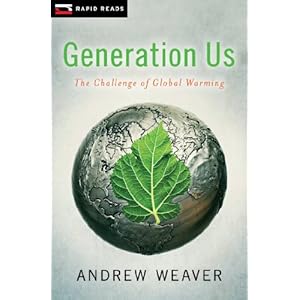
by
Scott A. Mandia (Long Island, NY) - See all my reviews
This review is from: Generation Us: The Challenge of Global Warming (Rapid Reads) (Paperback)
Climate change is the most important issue facing all of us today and tomorrow, therefore it is a topic that we must all try to understand if we are to make educated decisions about our future and the future of the generations that follow. Climate science is complex because it encompasses a wide array of various fields so even a scientist can find it a Herculean task to try to understand. So where does that leave the rest of us who wish to become educated?Fortunately, Dr. Andrew Weaver has delivered this wonderful little book designed for "climate beginners" that, in just over 100 easy-to-read pages, leaves the reader quite educated about why scientists know humans are causing the planet to warm and the various choices that society must consider in order to deal with the problem.
Weaver begins the book by describing the scientific method. Scientists try to answer questions by forming a hypothesis (prediction), collecting data, and the trying to see if the data supports the hypothesis or not. Weaver then explains the difference between weather and climate - resolving a major point of confusion that has led some to doubt global warming is even occurring. "Climate is what you expect, weather is what you get."
After the opening section, Weaver divides the book into three parts. Part one (What is the Problem?) educates the reader about how scientists know the world is warming and why humans are mostly responsible for that warming. In this part he explains the greenhouse effect, why it takes time for the planet to warm, rising sea levels, the expected increases in droughts and floods, and impacts on various ecosystems worldwide.
In part two (Why Should I Care?) Weaver uses a simple analogy of grazing cattle to show why no single nation can solve the problem but that all nations and all peoples must act together to avoid the "tragedy of the commons". This is an important concept for readers to grasp because often one hears "if the United States puts a price on carbon, China and others will not, and the US will lose jobs and its economic competitiveness." Of course, if each nation keeps pointing the finger at other nations saying, "you go first", nothing ever gets done! In part two Weaver also show how climate change is threatening our health and national security and how there are climate "tipping points" that, once passed, could cause negative consequences to become permanent.
In part three (What Can I Do About It?) Weaver asks the reader to consider this question: Do we have any responsibility for the well-being of future generations? Assuming the reader thinks yes, Weaver explains some of the choices humanity must make to adapt to climate change and to try to mitigate the changes that are expected. Using plain language and superb examples, Weaver describes why we must put a price on carbon and the various ways to do so which include cap and trade, carbon tax, and fee & dividend. Weaver describes how voluntary measures and international treaties have failed to slow carbon emissions and that apathy at elections, especially by our youngest voters, is increasing the likelihood that our future generations will bear a great burden.
Concluding the book, Weaver explains that only through a change in behavior of individuals and of our elected leaders can we assure our future and that of future generations. We must evolve from the Generation Me to the Generation Us.







No comments:
Post a Comment